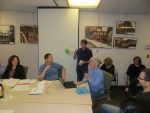New Castle Weighs Starting Food Scrap Recycling Program

The Town of New Castle is exploring a food scrap recycling program this summer that would compost a residential household’s food waste to significantly reduce the volume of garbage produced in town.
The program, which would be modeled similarly to the Village of Scarsdale’s initiative that began in January, would be cost-neutral if a modest 5 percent of New Castle’s households participate in the voluntary program, according to estimates provided by the town’s Sustainability Advisory Board (SAB).
In a presentation three weeks ago by the SAB, it was estimated that food scraps account for 15 to 20 percent of the town’s trash. With New Castle producing more than 6,200 tons of garbage a year, there would be the potential of reducing that volume by about 1,200 tons annually with full participation. That would amount to $76,000 a year savings in tipping fees.
On May 16, town officials also listened to comments by Michelle Sterling and Ron Schulhof, co-chairs of Scarsdale’s Food Scrap Composting Program.
In less than five months, Scarsdale had 600 households participating, roughly 10 percent of the village, and the feedback has been positive. There is optimism that more residents will sign up.
“We made it easy for people to help the earth and make a difference and they appreciate it,” Sterling said.
She said by composting food scraps, what would have gone into landfills is now converted into nutrient-rich soil and reused.
The most significant startup cost to the municipality would be an initial $5,400 outlay to buy 300 kits that each participating household would purchase. A kit includes a one-gallon kitchen pail, a six-gallon container used to transport roughly a week’s worth of food scraps to the town’s recycling center on Hunts Lane and liners for both receptacles.
Once the food scraps are brought to the recycling center, it would be carted away by Sani-Pro, the town’s hauler.
One-time startup expenses for the town would be $300 for signage and $600 for hauling. The extra hauling expenses would amount to $400 a month, but if 280 families participate, the reduction in garbage would pay for itself, according to SAB estimates.
The only other expense would be compostable liners for the containers. Scarsdale has estimated that is a roughly $500 annual cost to the village.
Suzi Novak, an SAB member, said interest has been running high among residents they have contacted. The SAB estimated that about 25 percent of the several dozen residents they have informally polled said they would participate.
“It’s getting people to think about it,” Novak said. “People have been receptive to it everywhere we go.”
The biggest drawback for participants would be having to haul the container to the recycling center, although in the future curbside pickup could be explored.
Michael Cicale, the town’s recycling foreman, said while there are challenges to the program, the effort should be manageable. Potential impediments include the sales of the kits and liners, making sure there is space in the containers at the center for residents to place their scraps and keeping track of the disposal fees.
Cicale expressed some concern about the possibility of odors from the recycling center. When he visited Scarsdale’s facility in March, there weren’t any issues with smell.
“I was hoping to revisit their site on a hot, humid day this summer, before we adopted the program,” he said.
Town Supervisor Robert Greenstein said New Castle has long been a leader on environmental-related issues and would like to follow Scarsdale and be among the first municipalities to have a food scrap recycling program. It’s already a widespread practice in schools, he said.
“Many school districts, including Chappaqua Central School District, are already doing it,” Greenstein said. “We should follow their lead.”

Martin has more than 30 years experience covering local news in Westchester and Putnam counties, including a frequent focus on zoning and planning issues. He has been editor-in-chief of The Examiner since its inception in 2007. Read more from Martin’s editor-author bio here. Read Martin’s archived work here: https://www.theexaminernews.com/author/martin-wilbur2007/
